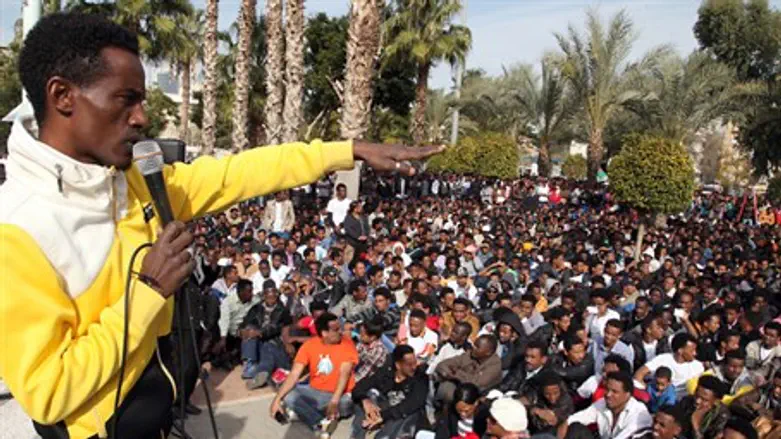
On Monday the High Court struck down key sections of the Infiltrators Law, ordering the closure of the Holot detention center in the Negev within 90 days and taking away powers allowing the state to hold infiltrators for a year without trial.
A senior Tel Aviv police source revealed Tuesday just how destructive that ruling will be for residents of southern Tel Aviv where infiltrators have congregated, noting the area has seen an incredible 40% drop in crime - and a 20% drop in serious crime - since Holot opened last December, according to Hebrew news site Walla!.
The source added that as the High Court decision drew nearer, the number of illegal immigrants asking to willingly leave Israel dropped considerably, after that number had risen greatly in August during Operation Protective Edge - the new laws had already led to over 5,388 infiltrators choosing to leave Israel by August.
Residents of southern Tel Aviv have long complained of the radical increase in violent crime that has accompanied the illegal immigrants, who have been proven time and again to consist of job migrants and not refugees. It has been charged that the High Court and leftist "human rights" groups don't care about rape in southern Tel Aviv due to a warped sense of values.
During a Jewish New Year (Rosh Hashana) ceremony held in Tel Aviv on Tuesday, Tel Aviv District Police Chief Nitzav Bentzi Sau spoke before officers, calling the court ruling "another stage in the very difficult feeling that the residents of the south of the city and us will need to prove that their security is not abandoned, and that the country cares about them and that we are protecting them."
Sau remarked that due to the ruling, the police will be forced to increase their presence in southern Tel Aviv, and added that police may also play a role in protesting the new decision.
"In every place that they (residents) go out to protest we will be there with them, not just to improve the feeling of security but also to outline together with them the borders of the protest. We have a social responsibility," added Sau.
Commenting on the positive effects of the freshly overturned Infiltrator Law, Sau said "there is not doubt the policy that was in effect until yesterday influenced the reality on the ground. The greatest challenge for us is how to preserve to those achievements and prevent an increase in crime."
"We expect that now the number of (infiltrators) asking to leave willingly will be particularly low," appraised the police commander. "But the question is what will be with those thousands in Sinai or other places trying to get into Israel. We will see if they will cross the border and arrive in masses as happened in the past."
Holot has held roughly 2,000 illegal immigrants, out of a total of just over 50,000 in the country altogether.
In protesting the move, residents of southern Tel Aviv set up a "mourning tent" on Monday evening at the Habima Square in the city.
There, Director of the Center for Immigration Policy Orly Yugir said, "the ruling is completely disconnected from the reality on the ground...the detention facilities have proven themselves most effective in stopping the flow of infiltration and the decisive factor in the decision of thousands of infiltrators to return to their home countries in recent months."